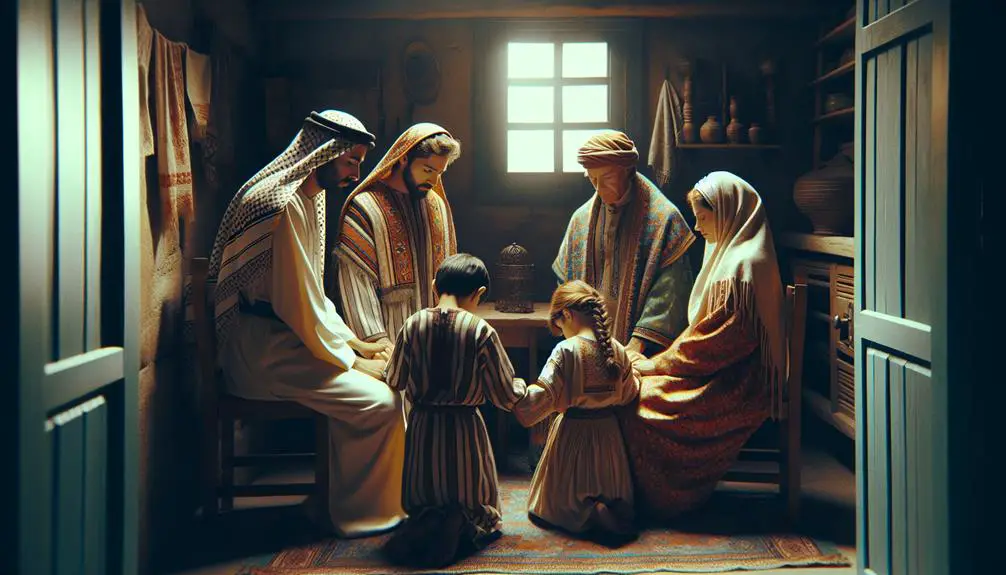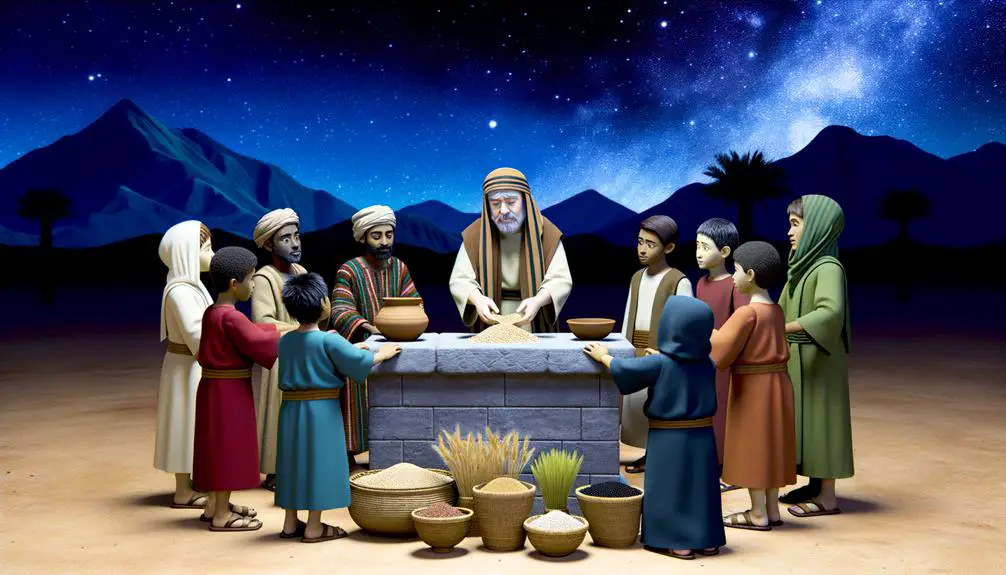Explore the transformative power of family prayers in the Bible, and how they shape the spiritual foundation of households.

Family Prayers in the Bible
Just as Joshua proclaimed, 'As for me and my house, we will serve the Lord,' the concept of family prayers has woven its way through the tapestry of Biblical narratives.
You'll find Abraham's fervent intercessions, Isaac's blessings over Jacob, and Hannah's heartfelt plea for a child among the rich examples. These instances not only highlight the personal faith of the individuals involved but also underscore the importance of spiritual leadership within the family unit.
As you explore these stories, you'll uncover the profound impact of prayer on family dynamics, leaving you to ponder how these ancient practices can inform and inspire modern family life.
Key Takeaways
- Family prayers in the Bible often intertwine intercession, blessings, and destiny shaping for future generations.
- Examples from Job and Hannah highlight the importance of proactive spiritual leadership and care within the family.
- Jesus' prayers emphasize the role of prayer in Christian leadership and the building of communal and personal relationships with God.
- Prayer practices, as seen through biblical figures, demonstrate transformation in faith, relationships, and spiritual vigilance.
Abraham's Intercessory Pleas

Within the biblical narrative, Abraham's intercessory pleas exemplify a profound engagement with divine will, showcasing his role as an intermediary between God and humanity. Abraham's dialogues with God, particularly regarding Sodom's fate, serve as a prime example of divine negotiation, where human compassion confronts divine judgment. This episode not only highlights Abraham's deep concern for justice but also illustrates the dynamics of prayer as a form of negotiation with the divine.
Abraham's approach to God regarding Sodom is marked by both audacity and humility. He doesn't just accept God's decision; rather, he engages in a bold yet respectful dialogue, questioning the righteousness of the divine plan. This interaction underscores the Bible's depiction of prayer as a complex relationship between man and God, where human beings aren't passive recipients of divine will but active participants in a dialogue with God. Abraham's pleas for Sodom reveal a unique aspect of his character and his relationship with God. He stands in the gap, so to speak, leveraging his relationship with the divine to argue for mercy and fairness.
Moreover, Abraham's negotiation over Sodom's fate introduces the concept of collective responsibility and individual righteousness within a community. His questions to God—'Will you indeed sweep away the righteous with the wicked?'—highlight a fundamental concern for the innocent and the justice of divine action. Through this narrative, the Bible invites its readers to ponder the nature of justice, the power of intercessory prayer, and the potential of righteous individuals to impact divine judgment. Abraham's intercessory pleas, thus, serve as a compelling example of how prayer can function as a means of engaging with and, to an extent, influencing divine will.
Isaac's Blessings on Jacob

You'll find Isaac's blessings on Jacob to be a pivotal moment in biblical narratives, where themes of deception intertwine with divine providence.
This incident not only marks Jacob's acquisition of Esau's birthright but also sets a precedent for future blessings and curses within their lineage.
Analyzing this episode sheds light on the complex dynamics of faith, family, and the consequences of deceit in sacred texts.
Deception and Blessing
In the narrative of Isaac's blessings on Jacob, deception intertwines with divine providence, illustrating a complex moment of familial and spiritual dynamics. This story is deeply rooted in sibling rivalry and parental favoritism, factors that catalyze the unfolding events.
You witness Jacob, favored by Rebecca, engaging in deception to secure the blessing meant for Esau, his elder brother, who's Isaac's favorite. This act of deceit not only highlights the intricate relationships within Isaac's family but also sets a precedent for the divine selection and blessing that often defy human expectations and norms.
Through this lens, the story serves as a critical examination of how divine will can operate within and despite human actions, leading to pivotal moments in biblical history without delving into the subsequent consequences of Esau's lost inheritance.
Esau's Lost Inheritance
Esau's loss of his inheritance, a consequence of Jacob's cunning deception, marks a pivotal moment in the biblical narrative, underscoring the complex interplay between divine intention and human agency. This event isn't just a family squabble; it's loaded with theological and ethical implications.
- Birthright significance: It wasn't merely about wealth or status; it was a spiritual leadership role.
- Jacob's strategy: His astuteness in leveraging a moment of weakness illustrates human resourcefulness and divine providence.
- Esau's moment of despair: Offers a profound lesson on the permanence of certain choices.
- Repentance opportunity: Despite Esau's loss, the narrative invites reflection on forgiveness and reconciliation.
Understanding this story involves grappling with the depths of faith, the consequences of our actions, and the possibility of redemption.
Jacob's Prayers for His Sons

As you explore Jacob's narrative, you'll notice his unique approach to blessing his sons, a pivotal moment that blends familial ritual with prophetic declaration.
These blessings, structured as prayers, serve not only as expressions of hope but also as foretelling tools that shape the future trajectories of his offspring.
Analyzing these instances, you'll uncover the layered complexities of spiritual inheritance and its implications for biblical families.
Jacob's Blessing Rituals
Analyzing Jacob's blessing rituals reveals a pivotal moment where he imparts future visions and divine promises onto his sons, shaping the destiny of the Israelite tribes. These ceremonies weren't just familial gatherings but carried deep ritual significance, influencing both family dynamics and the broader theological narrative.
To understand the depth, consider:
- Family Dynamics: Jacob's blessings tailored to each son reflect their personalities and future roles.
- Ritual Significance: These acts solidified the sons' standings and blessings within the family hierarchy.
- Theological Implications: Jacob's blessings had prophetic elements, forecasting the tribes' futures.
- Cultural Context: This practice underscored the importance of patriarchal blessings in ancient Israelite society.
Through these rituals, Jacob not only affirmed his sons' identities but also intertwined their destinies with the unfolding biblical history.
Prophetic Wishes for Offspring
Delving into Jacob's prophetic wishes for his offspring, we uncover a rich tapestry of aspirations that shaped the destinies of the Israelite tribes, reflecting an intricate blend of personal desires and divine foresight. Through his blessings, Jacob expressed not only his parental desires but also laid down generational promises that would define the futures of his sons and their descendants. These blessings, steeped in the cultural and spiritual milieu of the time, illustrate the profound connection between faith, family, and the unfolding of collective destinies.
Son |
Blessing Highlights |
Impact on Tribe |
|---|---|---|
Reuben |
Strength, firstborn |
Leadership challenges |
Judah |
Leadership, praise |
Royal lineage |
Joseph |
Abundance, favor |
Prosperity, influence |
Benjamin |
Fierce, protective |
Warrior-like qualities |
Hannah's Prayer for a Child

Hannah's heartfelt plea for a child, vividly depicted in the Bible, embodies a profound instance of personal supplication and faith. Her story, nestled within the pages of 1 Samuel, offers an intricate portrayal of a woman's anguish and her unwavering belief in God's power to intervene. This narrative isn't merely a historical account but serves as a beacon for those who find themselves beseeching divine intervention in their most desperate moments.
To understand the depth of Hannah's prayer, consider the following:
- Heartfelt Supplication: Hannah's prayer wasn't a casual request but a deep, soulful cry to the Lord. She poured out her sorrow and yearning for a child with intensity and vulnerability.
- Miraculous Conception: Her unwavering faith was rewarded with a miraculous conception, defying her barren state. This not only underscores the power of prayer but also God's ability to intervene in seemingly impossible situations.
- Vow to God: Hannah made a solemn vow that if she were granted a son, she'd dedicate him to the Lord's service. This highlights her selflessness and dedication to God, even in her petition for a personal blessing.
- Impact on Samuel: The child born from this prayer was Samuel, who'd grow to be a significant prophetic figure. His life and ministry were directly influenced by the nature of his mother's prayer and her commitment to God.
Hannah's story transcends time, teaching valuable lessons about faith, persistence, and the transformative power of prayer. Her heartfelt supplication and the miraculous conception of Samuel serve as powerful testimonies to the efficacy of earnest prayer and divine responsiveness.
Job's Offerings for His Family

Moving from Hannah's individual prayer for a child, we now examine Job's proactive offerings for his family's spiritual well-being, highlighting another dimension of faith's practice in the Bible. Job's actions demonstrate not only sacrificial faith but also spiritual leadership within the familial context. This story, nestled in the annals of biblical narrative, serves as a profound example of preemptive spiritual care.
Job's concern wasn't merely for the physical or emotional state of his family but extended deeply into their spiritual health. He offered burnt offerings for each of his children, thinking, 'Perhaps my children have sinned and cursed God in their hearts.' This act of sacrificial faith underscores the depth of Job's spiritual leadership. He didn't wait for a crisis to invoke God's favor but instead continually interceded on behalf of his family, illustrating a proactive, rather than reactive, stance on spiritual matters.
This narrative invites you to ponder the importance of spiritual vigilance within the family unit. Job's example encourages a leadership role in spiritual matters, advocating for an active rather than a passive approach to faith within the family. His actions convey a message that spiritual leadership involves constant, vigilant prayer and offerings, reflecting a deep concern for the spiritual well-being of one's family.
In this light, Job's offerings emerge not merely as ritual acts but as profound expressions of love, care, and responsibility. They epitomize the essence of sacrificial faith and spiritual leadership, serving as a timeless model for believers. By embracing Job's example, you're called to a higher standard of spiritual responsibility for your family, emphasizing the importance of preemptive prayer and spiritual oversight.
Jesus' Prayers With His Disciples
Transitioning from the Old Testament's familial spiritual practices, we now explore Jesus' engagements in prayer with His disciples, showcasing a pivotal aspect of His ministry and leadership. Unlike the more private or familial settings seen in the Old Testament, Jesus' prayers with His disciples often occurred amid pivotal moments in His ministry, serving both as instruction and as a means to fortify their faith.
Here are four significant instances that illustrate the depth and context of these prayerful interactions:
- The Last Supper: Here, Jesus not only shared a meal with His disciples but also instituted the Eucharist. His prayers of blessing over the bread and wine exemplify how He interwove prayer into communal gatherings, transforming them into profound spiritual lessons.
- The Garden of Gethsemane: This moment is perhaps one of the most personal and intense examples of Jesus' prayer life. He asked His closest disciples to watch and pray with Him as He faced imminent betrayal. His prayers here reveal His vulnerability and reliance on the Father, setting an example for His disciples on seeking divine strength in times of distress.
- Teaching on Prayer: Throughout His ministry, Jesus taught His disciples how to pray, most notably through the Lord's Prayer. These teachings underscored the importance of prayer in building a relationship with God.
- Prayers for His Disciples: Before His arrest, Jesus prayed not just for His current disciples but for all future believers. This intercessory prayer highlighted His role as a mediator between God and humanity, emphasizing the communal and inclusive nature of His ministry.
Through these examples, Jesus' prayerful interactions with His disciples underscore the importance of prayer in Christian leadership and community, serving as a model for spiritual engagement within any familial or communal context.
Frequently Asked Questions
How Can Modern Families Adapt These Biblical Prayers to Address Contemporary Issues They Face Today?
To adapt ancient prayers for today's challenges, you can customize these prayers to reflect contemporary issues you're facing. This might involve integrating technology, like creating a family prayer app or using social media to share prayers that address modern concerns like climate change or social justice.
Are There Any Examples of Family Prayers in the Bible That Specifically Address Reconciliation After Family Conflicts?
Interestingly, 85% of families report experiencing conflict, making conflict resolution crucial.
When exploring conflict resolution within family dynamics, it's evident that biblical examples offer profound insights. One notable instance is the prayer of Jacob before meeting Esau, which essentially serves as a plea for reconciliation after a significant family conflict.
This scenario underlines the timeless relevance of seeking divine intervention in mending familial relationships, emphasizing humility and the desire for peace.
How Do Different Christian Denominations Interpret the Significance of These Family Prayers Within Their Own Practices?
In analyzing the significance of prayer rituals, you'll find denominational differences shape their interpretation within Christian practices.
Some denominations emphasize communal prayer, seeing it as a cornerstone for spiritual unity and reconciliation, while others prioritize individual prayer experiences, highlighting personal communication with God.
These variations reflect deeper theological perspectives and traditions, illustrating how denominational backgrounds influence the understanding and incorporation of prayer rituals in addressing conflicts and fostering spiritual growth.
In What Ways Can Single-Parent Families or Individuals Without Children Incorporate the Essence of These Family Prayers Into Their Personal Prayer Lives?
Exploring the depths of your spirituality, you might wonder how to weave the essence of collective prayers into your own fabric of devotion.
Individual spirituality thrives on prayer personalization, allowing you to tailor these sacred conversations to your unique life circumstances.
Regardless of family structure, you can cultivate a rich, personal prayer life that mirrors the communal spirit, drawing from ancient traditions to nourish your soul in solitude or in smaller family units.
What Are the Psychological and Social Benefits of Engaging in Family Prayers, as Demonstrated by These Biblical Examples, for Families in the 21st Century?
Exploring the psychological and social benefits of family prayers, you'll find they significantly influence neurological impact and community cohesion.
Engaging in such practices can enhance emotional bonding, promote mental well-being, and foster a sense of belonging.
This not only strengthens family units but also extends to wider community relationships, contributing to a supportive network.
Analyzing these aspects reveals the profound influence of collective prayer on individual and communal health in the 21st century.
Conclusion
In conclusion, family prayers in the Bible exemplify the profound impact of spiritual intercession within familial dynamics.
Take, for instance, Hannah's fervent prayer for a child, which not only underscores the personal desperation and faith in divine intervention but also highlights the communal aspect of prayer in reinforcing family bonds.
This analysis suggests that such prayers aren't mere petitions but deeply embedded practices that shape familial relationships and faith trajectories, demonstrating the intertwined nature of religion and family life.



Sign up